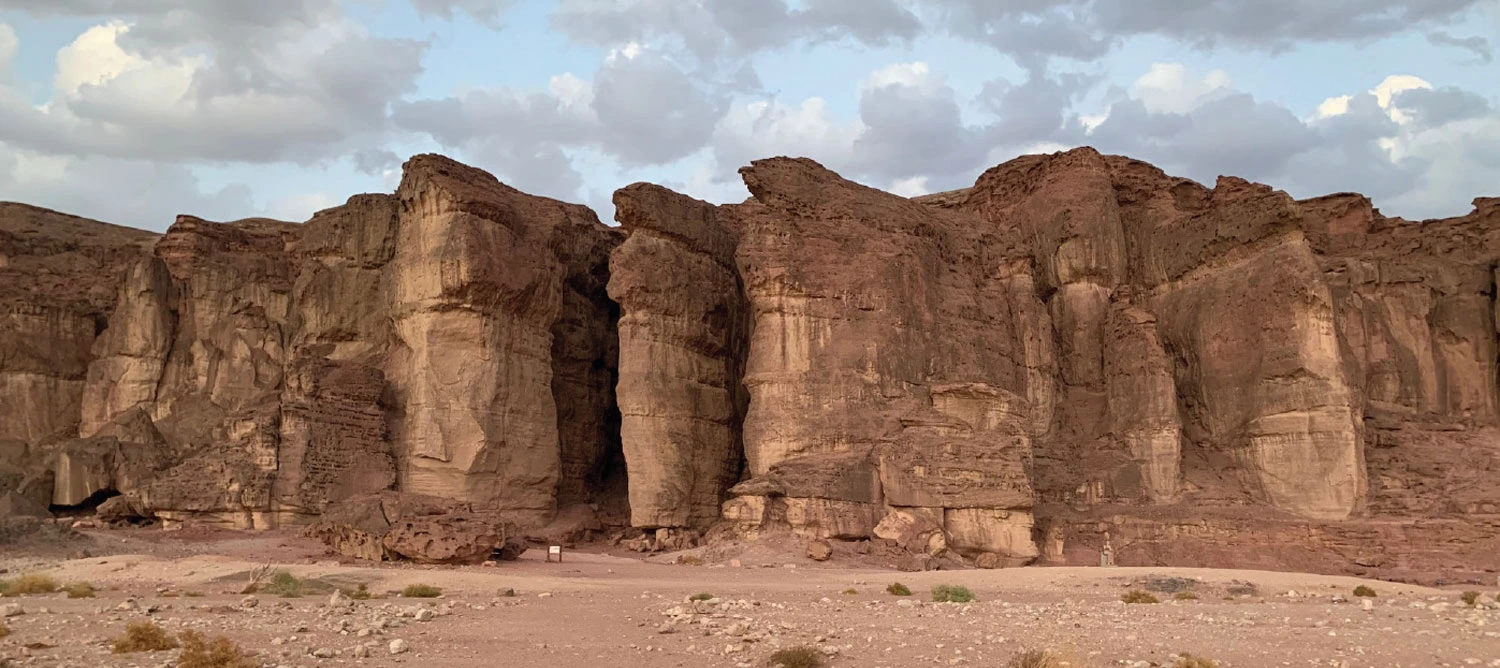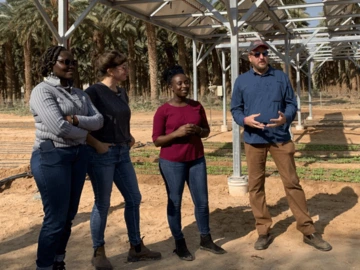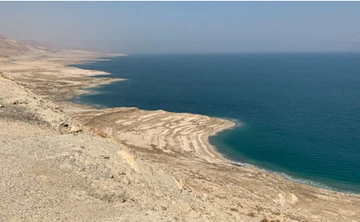
Solomon’s Pillars, Timna Park, Israel. Photo: Sharon B. Megdal
The Colorado River Basin’s water and energy problems are well chronicled in studies and news reports. With the Colorado River’s low flows extending more than two decades and drawdown of water from Lakes Powell and Mead, water in storage is at historic lows. Moreover, the system’s hydropower is in jeopardy. Most critically, a “crash” of the system, wherein water would not flow below Hoover Dam, could be more than just a bad sci-fi story. Work is ongoing to develop a consensus strategy that, at the least, increases water delivery cutbacks substantially over those associated with the official 2007 federal guidelines for sharing shortage. Partnerships among stakeholders with diverse expertise, experience, and perspectives will be vital to restoring system security.
While situations vary across the globe, water insecurity like that in the Colorado River Basin is pervasive. Many people remain without access to electricity. Food insecurity, including threats to food chain reliability, has been magnified by the war in Ukraine and low flows in usually reliable river transportation systems. Growing populations and increases in income levels stimulate demand for more food at a time when the quantity — and quality — of water supplies is uncertain. Concerns about the availability of sufficient, good quality water apply both to surface water and groundwater. In response to these thorny and worsening challenges, work on identifying and implementing solutions to food, water, and energy insecurity is intensifying. My recent travels were related directly to this work and the global connections needed to meet these challenges and identify pathways to solutions.
My first stop was connected to the work of the Kasser Joint Institute for Food, Energy, and Water Security, a unique partnership of the University of Arizona, Jewish National Fund (JNF)-USA, and the Arava Valley in the South of Israel. After a three-year hiatus, the partners met in late October in Israel. An overarching goal of the Kasser Joint Institute is to assist communities in Africa and elsewhere address their food, water, and energy insecurities cost-effectively and sustainably. Since late 2019, researchers associated with the institute have explored the performance of agrivoltaic systems in varied climate, water, and crop conditions. Aquaponic research involving the growth of fish feed as part of fish farming systems is ongoing, as is study of off-grid, solar-powered water treatment. A team of Kasser Joint Institute volunteers and researchers traveled to Kenya this past summer to identify communities for cooperation. Despite the COVID-associated challenges, great progress was made. Joaquin Ruiz, UArizona Vice President, Global Environmental Futures, and I represent the University of Arizona on the Kasser Joint Institute Board of Governors. Professors Greg Barron-Gafford, Kim Ogden, and Kevin Fitzsimmons, along with UArizona Tech Parks Vice President Carol Stewart, joined the October meetings in Israel. A highlight was the participation of Beth and Mike Kasser of Tucson at the October 24, 2022, institute dedication ceremony, which took place in Sapir, Israel.

Agrivoltaics in the Arava Valley, Israel.
Photo: Sharon B. Megdal
During a few additional days in Israel, I met with many water colleagues, all of whom focus on managing scarce water resources in the face of growing demands. I saw the test fields of N-Drip, a company working with Arizona farmers, assessing the performance of gravity-fed drip irrigation. I met with researchers and drainage authority personnel concerned with flash flooding. I learned about agriculturally focused research and received an update on the continuing expansion of desalination in the region. In my lecture at a weekly seminar of the Porter School of the Environment and Earth Sciences at Tel Aviv University, I spoke about transboundary cooperation in the Colorado River Basin.
Immediately upon returning to the US from Israel, I participated in the first annual meeting of a USDA-funded project on groundwater-dependent agriculture in California’s Central Valley, Arizona’s Pinal County, and New Mexico. The host institution for the five-year grant is the Agricultural Water Center, established at University of California, Davis. The Center’s vision is to alleviate groundwater overdraft and water quality deterioration in major aquifer systems and advance socioeconomic resilience through agroecological and technological innovations. In addition to connecting groundwater to production of food and fodder, the project is concerned with the health of communities that depend on agricultural activities. Many universities and government researchers are partnering in this project.
From Davis, California, I traveled to Boston, Massachusetts, to the annual conference of JNF-USA, where I shared information and insights related to water scarcity and food, water, and energy security issues through a keynote and panel remarks. The mix of conference attendees confirmed for me the value of interacting and partnering with interested stakeholders of varied backgrounds. I often say that everyone is a water stakeholder because everyone depends on water. The viewpoints of water users are important inputs to the water investment and policy decisions of those who decide; water users are decision maker influencers.

Dead Sea. Photo: Sharon B. Megdal
Boston was not the end of my travel itinerary. My last stop was the American Water Resources Association annual conference in Seattle, Washington, where I was joined by colleagues from UArizona. Our participation in this multi-faceted conference dealt with issues of diversity, equity, inclusion, and justice and water priorities of Indigenous individuals and communities. There is growing recognition that as we consider alternative solutions to food, water, and energy security, different situations and diverse perspectives must be considered and factored into decisions.
During these 2.5 weeks of travel, I had several opportunities to share my perspectives through presentations and panel remarks. In many instances, I invoked the wicked water problems framework, which highlights the complex nature of the problems we are working on. The imbalance between the demand for and supply of Colorado River water is a wicked water problem. The shrinking of the Dead Sea is another. We cannot guarantee solutions to the underlying problems, but we can work together to develop pathways to address the problems. Working together is the key. It will be through partnerships that respect differences in expertise, experience, and perspectives that we will make progress in strengthening food, water, and energy security.
Additional Info:
- About the Kasser Joint Institute
- UC Davis Center, which includes info about the meeting / Presentations

